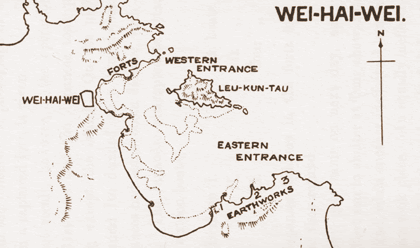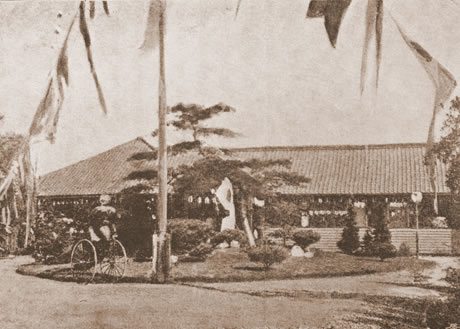WEI-HAI-WEI
On January 18, 1895, the Japanese fleet bombarded Teng-chow-foo, facing Port Arthur on the Chinese mainland. It is about eight miles west of Wei-hai-wei.
On the 19th the bombardment was continued; on the 20th the army was landed to the east of Wei-hai-wei.
Wei-hai-wei was moderately fortified, chiefly with 8-in. Krupp guns. There were a few larger ones, and a sprinkling of modern pieces. Mostly, however, the guns were old. On Leu-Kun tau were some more forts, a gunnery school, and a coaling station. The Chinese fleet lay behind this island, the Japanese watching both entrances, which were protected by booms.

Map of Wei-Hai-Wei.
On the30th the Japanese fleet and army opened fire on the defenses. In this affair the Chao-pei-tsui defenses were silenced by the Naniwa, Akitsushima, and Katsuragi, the division being under command of Captain Togo. The magazine was exploded, and the forts taken possession of by the Japanese soldiers. Before retreating, however, the Chinese destroyed all save a few old guns.
The rest of the fleet bombarded Leu-Kun tau without much result on either side. The Chinese warships took part in the defense. A photograph of this battle, taken from a captured fort, is given.

Bombarding Japanese vessels.
The net result, however, of the operations of the 30th and 31st was that the Japanese took practically everything except the island. On the night of the 31st, Admiral Ito decided on a torpedo-boat attack. Both entrances had some boom defense, with gaps here and there. The Japanese attempted to attack by the east with sixteen boats.
Division I… six boats.
" II… six
"
" III… four "
The Japanese soldiers in the forts took them for Chinese, so they retired.
A heavy gale came on next day, and the whole Japanese fleet ran to shelter at Teng-chow, returning on February 2nd, when another ineffectual bombardment at 2500 meters took place. An equally ineffective torpedo attack was tried in the night. It failed, as the Chinese sighted the boats, and they wisely did not try to force their way in.
Next day, and the next again, the bombardment was violently renewed, but on both sides it led to nothing save expenditure of ammunition. Landings on Leu-Kun tau led to nothing, and the only incident of real moment was the rushing out of twelve Chinese torpedo-boats on the 4th.
Several were sunk as they came out; the rest ran ashore, and were captured or destroyed. So far as can be gathered, Ting had found his boats a nuisance, and was in terror of the Japanese boats being allowed in, in mistake for Chinese boats. He also appears to have imagined that a daylight attack might produce something in his favor; but the balance of evidence seems to point to the fact that the boats were a nuisance to him.
Whatever was intended, the Chinese boats made no attack on the Japanese cruisers; escape was their only objective. Only two succeeded in getting away.
On the night of the 4th the third torpedo attack was made. The boats went in, in three divisions of four each, though only the second and third divisions went in-the first being employed to create a diversion at the western entrance.
The eastern boats crept in slowly, in a cold so intense that an officer and two men were frozen to death. Two boats (8 and 21), their steersmen frostbitten, grounded as they tried to enter.
By four o'clock a boat had got quite near the Chinese, and fired two torpedoes without result; a second boat was no luckier with three. Not till then did the Chinese open fire, and this boat ran ashore immediately afterwards.
Two more boats collided in the confusion, another had her boilers burst, yet another was badly hit. Only one boat came out unscathed. As mentioned further on in "Personal Characteristics," the real truth of the attack has never been known, and never will be, save vaguely.
Its result, however, is well known, the battleship Ting Yuen was hit in the stern and sank in the mud, where she lay with her upper works above water and guns still firing.
Throughout the 5th the bombardment continued unabated, and though no harm was done, the ceaseless worry told heavily on the Chinese.
On the night of the 5th a fourth attack was made by the first division. It met with little resistance, torpedoed the Lai Yuen and dispatch vessel, the Wei Yuen, and also hit the Ching Yuen in the bow without sinking her. The boats met with no defense worth mentioning; the Chinese look-outs, worn out with the ceaseless bombardments, were mostly asleep.
On the 6th a landing was effected on Leu-Kun tau, and on the 7th the usual bombardment continued. The Matsushima, Naniwa, and Yoshino were hit, but the Chinese lost a magazine, blown up.
On the 9th the Ching Yuen sank, her end being accelerated by a water-line hit from a shore gun. The Itsukushima was hit on the water-line this day by a shell from the 12-in. guns of the Chen Yuen, but the shell failed to burst. On the 10th and 11th the bombardment still continued. Only one fort now remained to the Chinese, but their ships still afloat were comparatively little hurt. The moral effect of the continuous firing finally broke them down, and on the 12th, in the midst of the firing, a gunboat flying a white flag came out.
The Japanese ceased fire, and the gunboat came to the Matsushima. Two officers from the Chinese fleet came on board, and delivered a letter from Admiral Ting to Admiral Ito, suggesting terms of surrender. It is worthy of note that, so one of the Matsushima's officers told me, these two Chinamen, on being taken to the wardroom to await Admiral Ito's reply, promptly and instantly fell asleep, and were only awakened later with the greatest of difficulty. They were absolutely worn out. It is stated, also, that the whole of the beleaguered crews did the same thing directly firing ceased; want of sleep was, indeed, the immediate cause of Admiral Ting's surrender, though, of course, his position was absolutely hopeless.
Ting surrendered on condition that the lives of his men were spared, but he and his principal officers committed suicide. The whole of the defenders were executed by the Chinese at the first available opportunity.
Japanese naval losses during the this affair were officially given as:-
2 officers and 27 men killed.
4 officers and 32 men wounded.
On shore the army lost much more heavily, as during the fighting the entire force occupying one captured fort were destroyed by the Chen Yuen, which steamed up close to them and opened fire.
Chinese losses were never stated, but they are believed to have been much less than was expected. The entire crews of the Lai Yuen and Wei Yuen were lost, and most of those in the Ching Yuen.

Celebration at the Naval Club, Tokyo.
Wei-hai-wei was won chiefly through sheer human inability to stand the strain of the everlasting bombardment and torpedo menace. Guns accomplished practically nothing directly towards it, and even the torpedo per se was not decisive. The principal factor was Admiral Ito's persistent and unremitting attack.
With Wei-hai-wei the war was practically over. The only remaining incident
of note was an attack on Formosa, in which, if all accounts are true,
the Japanese did not shine very greatly, or else there are problems
in war which in peace cannot be conceived. It is stated that the Japanese
began to bombard at 8 a.m. The Chinese had loaded all guns; they left
a few men to fire them, and then retired. Reply ceased about 8.30, but
the Japanese did not, it is said, discover it till about 2 p.m. An explanation,
of course, is that they did not trust the silence of the forts-which
is reasonable enough. That they did not notice it is the accusation
of their critics.
source: The Imperial Japanese Navy, Fred T. Jane, 1904
